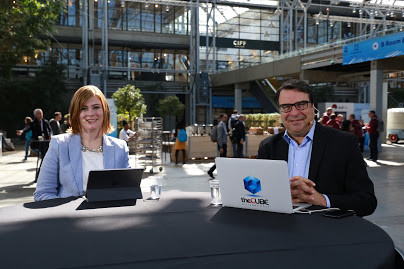 CLOUD
CLOUD
 CLOUD
CLOUD
 CLOUD
CLOUD
As the largest project at the Linux Foundation, Kubernetes has seen marked growth in the past year. The open-source platform for managing container orchestration is piquing interest for software developers worldwide, enabling workload portability and supporting the new trend toward microservices in the fast-paced world of cloud computing.
“Outside of Silicon Valley, most have heard of Kubernetes but don’t know what it is and where it’s going to be applied,” said John Furrier (pictured, right), host of theCUBE, SiliconANGLE’s mobile video studio. Kicking off day one of coverage for KubeCon + CloudNativeCon EU in Copenhagen, Denmark, Furrier sat down with co-host Lauren Cooney (left) to discuss first impressions of the conference. (* Disclosure below.)
Citing a survey presented by Cloud Foundry Executive Director Abby Kearns during the conference keynote, Furrier noted the rising star status of Kubernetes: “It’s taken the world by storm,” he said. “Application developers are seeing the good of what Kubernetes will do when you look at multiple workloads, workload portability, microservices. As the growth of applications becomes cloudified, Kubernetes is key.”
Kubernetes adoption has increased from 27 percent to 43 percent in the past year among information technology administrators claiming it as their primary container orchestration tool, according to a 2017 survey by Portworx. Popular within the open-source community as well, Kubernetes has the support of industry leaders, such as Google Inc., Red Hat Inc and Microsoft Corp. With 4,000 attendees at this year’s conference and a growing list of show sponsors, Kubernetes is fast becoming an industry standard.
“The growth in Europe — it feels like we’re in North America in terms of volume,” Furrier observed. “Kubernetes is the talk of the show.”
Industry adoption is great for Google, the company that created Kubernetes and eventually donated it to the open-source community by forming the Cloud Native Computing Foundation, which promotes container technologies. Google’s presence is felt strongly on the show floor, according to theCUBE hosts, despite booths and workshops from Red Hat, Amazon Web Services Inc. and Microsoft. This indicates Google’s dedication to Kubernetes, hoping to leverage its open-source contributions to gain a better position in the cloud services market.
“They have to be [here],” said Cooney, commenting on Google’s strong vibe at KubeCon. “And what’s interesting is AWS did show up here. I was bouncing between some of the trainings with … AWS — there were a lot of folks attending, and interested.”
So much growth, however, can lead to challenges. As Kubernetes gains market share, it faces the same scaling issues as most other open-source projects. With a global contributor pool and countless plug-ins, Kubernetes is dependent on the developer community to become mature enough for enterprise-ready products.
“What’s not yet clear to me is really how large the Cloud Native Computing Foundation has gotten, how it’s going to fit together, and how users will take advantage of that ecosystem,” Cooney said. “With so many partners and users, how do you actually pull that together in a way that’s workable from the perspective of a platform.”
Cooney and Furrier will also be digging into the job market impact of automation, as the Kubernetes ecosystem finds more new ways to automate things like workload detection. Security is another area of interest for this week’s event coverage, as questions remain regarding the optimal way to deploy endpoint security within the Kubernetes platform.
Here’s the complete video, and there’s much more coverage of KubeCon + CloudNativeCon EU from SiliconANGLE and theCUBE. (* Disclosure: Some segments are sponsored by the Cloud Native Computing Foundation to support editorial coverage. Neither the CNCF nor other sponsors have editorial control over content on theCUBE or SiliconANGLE.)
THANK YOU